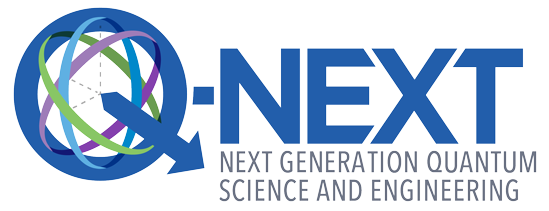In the News
-
Physicist Nadya Mason appointed dean of Pritzker School of Molecular Engineering
From the University of Chicago: Experimental physicist Nadya Mason has been appointed dean of the Pritzker School of Molecular Engineering at the University of Chicago, effective Oct. 1, 2023. A highly accomplished academic leader and elected member of the National Academy of Sciences, Mason is the Rosalyn S. Yalow professor of physics at the University of Illinois Urbana-Champaign, where she specializes in experimental studies of materials. Read More
-
Sound is manipulated for quantum information processing
From Physics World: University of Chicago's Andrew Cleland and team show how sound can be used to create two quintessentially quantum effects: superposition and interference. As a result, sound-based technologies could soon be used to create quantum computers. Read More
-
Laura Gagliardi awarded the 2023 Pauling Medal Award for outstanding achievements in chemistry
From the University of Chicago: With the award, University of Chicago Professor Laura Gagliardi is honored for the development of groundbreaking electronic structure theories and combined classical/quantum methodologies that have accelerated the design of new materials, including reticular frameworks. Read More
-
Chicago hopes to become a world center for quantum research
From The Economist: Q-NEXT Director David Awschalom weights in on how Chicago is moving to the forefront of the quantum industry. Chicago’s strength in quantum research in part goes back to its days at the center of research into the nuclear industry. Argonne National Laboratory opened in 1946 as a hub for research into nuclear power. Today, Illinois generates more electricity from nuclear power than any other state. And it was the visionary thinking by Robert Zimmer, a former president of the University of Chicago, that was responsible the city’s more recent quantum leap. Read More
-
How splitting sound might lead to a new kind of quantum computer
From The Conversation: Andrew Cleland of the University of Chicago writes about using beam splitters to explore the quantum properties of phonons. His findings could lead researchers to use phonons to build a new type of quantum computer. Read More
-
Quantum computers could break the internet. Here’s how to save it
From Science News: Q-NEXT Director David Awschalom and student Nolan Bitner are featured in this article on quantum cryptography and a future quantum internet. Read More
-
Hannes Bernien receives NSF CAREER award to unlock potential of quantum networks
From the University of Chicago: Hannes Bernien has been awarded a prestigious Faculty Early Career Development (CAREER) award by the National Science Foundation for his proposal to construct and connect quantum network nodes through quantum entanglement. Read More
-
New center aims to expand the role of semiconductors
From the University of Wisconsin–Madison: The new Wisconsin Center for Semiconductor Thermal Photonics at the University of Wisconsin–Madison will combine research in photonics, thermal science and quantum science to understand how semiconductors could be used to control the flow of heat. Read More
-
How spectator qubits can reduce noise in quantum computers
From AZo Quantum: In a Q&A, the University of Chicago's Hannes Bernien talks about his research on noise-reduction in quantum computers through spectator qubits. Read More
-
Sound-based quantum computers could be built using chip-sized device
From New Scientist: A crucial building block for quantum computers based on sound has been shown to work for the first time. Andrew Cleland at the University of Chicago have built a chip-sized device that can manipulate particles of sound in a way that mimics how particles of light are used in light-based quantum computers, opening the door for building sound-based quantum computers. Read More
News and features
See all news and features-
Design rules and synthesis of quantum memory candidates
From the University of Illinois Urbana-Champaign: Researchers use density functional theory calculations to identify possible europium compounds to serve as a new quantum memory platform. They also synthesize one of the predicted compounds, a brand new, air-stable material that is a strong candidate for use… Read More
-
‘Ruler for light’ could enable detailed measurement in personal devices
Frequency combs have revolutionized precision measurement, but the bulky, power-hungry devices are limited to lab settings. A new efficient laser “microcomb” developed by Stanford researchers could bring that revolution to the handheld electronics realm. Read More
-
Resurrecting niobium for quantum science
For years, niobium was considered an underperformer when it came to superconducting qubits. Now scientists supported by Q-NEXT have found a way to engineer a high-performing niobium-based qubit and so take advantage of niobium’s superior qualities. Read More
-
Researchers from startups, government labs and academia develop new techniques for making qubits out of erbium
Argonne project addresses quantum technology challenges and highlight sthe versatility of a rare-earth metal used in lasers and to color glass. Read More
-
Meet Edward Schmitt, facilities engineer
Former Marine Corps electronics technician Edward Schmitt keeps the Argonne Quantum Foundry running while advocating for veterans. Read More
